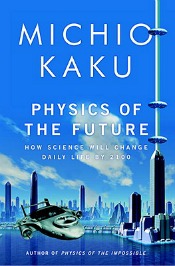After months of reading, debate, and discussion, the winners of this year’s Indie Lit Awards have been announced. I’ll be posting my reviews of the shortlisted titles this week!
 Title: Physics of the Future: How Science Will Shape Human Destiny and Our Daily Lives by the Year 2100
Title: Physics of the Future: How Science Will Shape Human Destiny and Our Daily Lives by the Year 2100
Author: Michio Kaku
Genre: Nonfiction
Year: 2011
Acquired: Library
Rating: 




Review: By the year 2100, we’ll be able to control computers with our minds, cars will be able to drive themselves, DNA sensors and microparticles will scan our bodies for signs of an illness and we’ll be able to take an elevator to space. At least, that’s the world that Michio Kaku imagines in his book Physics of the Future.
Physics of the Future is a look at the future based on the work and predictions of scientists who are actually doing the work that is going to change how the world looks in 100 years. In that way, the book is deeply fascinating. However, I was disappointed is how many moments felt like they only scratched the surface of what seemed like the most interesting details about how science is going to fundamentally change the way we live.
Kaku’s book is divided into nine chapters, each on looking at the short-, medium-, and long-term advances in a particular type of technology, everything from computers to artificial intelligence to wealth. One of the things that Kaku is best at is creating analogies that help explain the advancement of science and how those of us who are not scientists can understand how innovations build on one another. One of my favorites was his illustration of how the development of more advanced computer chips changes society:
When these chips are inserted into an appliance, it is miraculously transformed. When chips were inserted into typewriters, they became word processors. When inserted into telephones, they became cell phones. When inserted into cameras, they became digital cameras. Pinball machines became video games. Phonographs became iPods. Airplanes became deadly Predator drones. Each time, an industry was revolutionized and was reborn. Eventually, almost everything around us will become intelligent. Chips will be so cheap they will even cost less than the plastic wrapper and will replace the bar code Companies that do not make their products intelligent may find themselves driven out of business b their competitors that do.
The one problem of the book, at least for me, was that Kaku glossed over some of what I thought was most interesting, the human anecdotes that make science come alive. I loved Kaku’s stories about how he got to visit various laboratories and test out early version of future technology, but those moments felt few and far between.
Kaku also makes a very strong argument in favor of science as an instrument of progress (as opposed to religion, which goes against scientific progress, he argues) in his last two chapters about the future wealth and humanity. I can only imagine that stance would rub people the wrong way, but I was convinced. The argument made me interested in reading some other older history of science books, particularly the advancements of scientists in the Middle East before the Enlightenment in Europe.
Despite the fact that Kaku sees a future in which much of our lives are controlled and automated, I believe him when he suggests that the future of humanity will belong to the smart, creative, and innovative people that can drive our future. While Kaku’s book doesn’t highlight those people as much as I wish it had, I still finished it feeling excited and optimistic to see the technology that will advance in my lifetime.
Other Reviews:
If you have reviewed this book, please leave a link to the review in the comments and I will add your review to the main post. All I ask is for you to do the same to mine — thanks!

Comments on this entry are closed.
Does this book address the topic of education? Just curious. I’m reading a dystopia book right now and I tell you that I might approach this book with slight trepidation, actually!
Ummm, you know, I can’t remember. I don’t think education comes up as a specific topic, but might be a minor part of some chapters.
I’ve been looking forward to this review since you mentioned it was on your to-read list 🙂 I haven’t read this book, but I think you did a great job high-lighting the strengths and weaknesses I’ve seen in Kaku’s other books. Thanks for the great review!
Oh good, I’m glad what I noticed seemed to mesh with his other books. I’d be interested in picking up some of his other books in the future, I think.
I’ve got this on my wishlist – I think it’s very interesting. But indeed, a pity that he leaves out the people-side of the story a bit.
I hope you enjoy it!